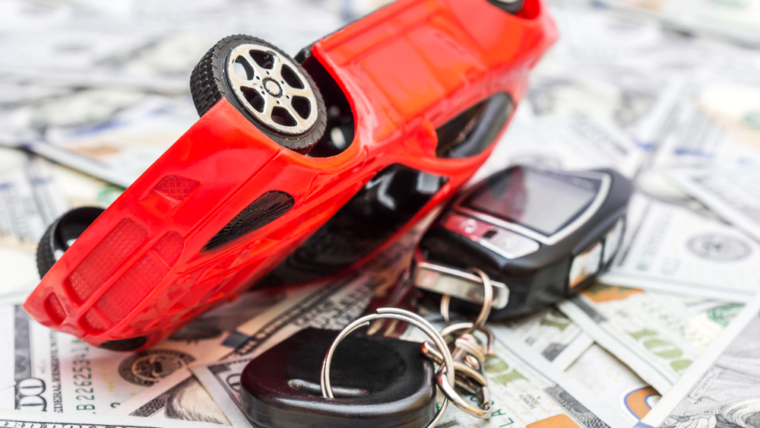Short Answer:
YES, you can get approved for a car loan with a $500 down payment and a 500 credit score. The downside is that you’ll receive a car loan with a higher than normal interest rate, making the total cost of the car more expensive. Loans come in all shapes and sizes, and auto loan options are available for customers with either no credit history or an imperfect credit history.
What’s a Good Credit Score for a Car Loan?
According to Experian, the average recipient of a car loan has a credit score of 600 or more.
You may not have a 600 credit score today, but you can improve your credit score over time, increase your down payment, or both to improve the terms of the auto loan you eventually get. Let’s take a look at all of the factors that can reduce or improve your credit score so you can get the best possible loan for your situation.
Banks and auto dealership finance departments will charge higher interest rates to customers with lower credit scores. The higher interest rate offsets the risk involved with providing a loan to someone with an imperfect credit history.
Getting approved for a car loan and securing a good interest rate is dependent on your credit score, job time, the vehicle and the down payment. Let’s discuss ways to improve your credit score to help you get approved and with an interest rate that’s affordable.
First Step: Check Your Credit Score
Before you arrive at the car dealership, you’ll want to know exactly what your current credit score is. Credit scores can change from month to month, so if you haven’t checked in a few months it could be very different. If you launch your credit card app, it will likely list your current credit score. If not, you can check your credit score for free from any of the three credit reporting agencies:
Transunion credit report
Equifax credit report
Second Step: Check Your Credit Report for Errors
Your credit report is collected from multiple companies and agencies. Around 20% of people have at least one error on their credit report, so it’s always helpful to check. Credit report errors can include the following:
- Non-existent late payments
- Non-existent unpaid debt that’s been sent to collections
- Incorrect personal information like name and address
- Incorrect account statuses (a closed account being listed as open or vice versa)
- Incorrect credit utilization ratio
- Identity-theft related issues (cards or balances created by an identity thief)
- Incorrect account balances (listing more than you owe)
- Mixed files (someone else’s credit information mixed in with yours)
There are a number of different ways that incorrect information on your credit report can result in a lower credit score. Review your credit report and contest any inaccurate information. You can contact the credit reporting agency to contest any errors on your report. They have thirty-five days to review and respond. If the change is approved, be sure to check again afterward to make sure your report is updated. If they got it wrong once, they could get it wrong again.
Save Money for a Larger Down Payment
The larger your down payment is, the smaller the starting car loan will be. This translates to less risk for the lender, and a smaller total loan for the buyer. Down payment is crucial for your approval odds if you don’t have the strongest credit history. The more money you can save up for a down payment, the more likely your loan approval will be and the better the terms. If you have $500 for a down payment on a $20,000 car that would only be 5% down. If you can increase that amount to 10% or more, you’ll have a better chance of getting approved for the loan.
Even better, because your down payment is larger you’ll have smaller monthly payments that can be paid off faster, saving you money on interest!
Remember the TOTAL Cost of Car Ownership
One mistake that car buyers make is forgetting how much a car costs beyond the monthly payment. You’ll have to pay for your car insurance, gas, maintenance, and annual vehicle registration. Make sure that you can afford the monthly car payments AND all of the additional costs that come with car ownership.
Consider a Co-signer
For customers who are still building their credit, they can sometimes have someone co-sign a loan with them. This is typically a parent or close family relative that the lenders like to see living at the same address. The co-signer agrees to take on the responsibility of the loan with you.
Improve Your Credit Score to Land a Better Interest Rate
Keep in mind that having a 500 or lower end credit score isn’t permanent. With a little hard work you can improve it. Increasing your credit score can mean more loan approvals and lower interest rates. Your credit score gets revised each month, so the more you work at it the faster it will go up.
There are two types of people with low credit scores: people who are just starting out and building their credit history (first time buyers), and people who have had their credit score reduced due to missed payments and derogatory actions. Whether you’re just starting out, or working on repairing your credit, the following tips will help you increase your credit score.
Use Your Credit Cards Responsibly
Your credit score is an assessment of how you use your credit cards. If your credit card is just sitting in a drawer and not being used, you aren’t building a credit history. If you’re using your credit card for every purchase and missing payments, you’re bringing your credit score down. Use your credit card often, but use it wisely, and try to keep the utilization below 10%
Keep in mind that your credit line is basically a short term loan. If you wouldn’t ask someone to loan you money to buy something, you shouldn’t be charging it to a credit card.
Pay Your ENTIRE Credit Card Balance Each Month
If it’s possible, paying off 100% of your credit card balance each month is the absolute best way to improve your credit score. Having a credit card you use exclusively for small purchases and then pay off at the end of the month is a great tool to boost your credit.
As a side note, if you need to buy big ticket items like a TV or furniture it’s better to save up and pay with a debit card whenever possible. Making small credit card payments to slowly pay for a big ticket item while accruing interest will just cost you more money in the long run.
Pay the Minimum Amount Due Each Month
If you can’t pay off your entire credit card balance, pay the minimum amount due – and pay it on time. Your credit score is a measurement of how responsible you are with your credit cards. One great way to show that you’re responsible is by making timely payments.
Minimum Amount Due Tip: Your minimum amount due is going to be a percentage of your card’s balance. The more money you pay off, the lower your minimum amount due will be.
Your monthly credit statement will list the minimum amount due and when you need to pay it. Keep in mind that bill payments are often delayed by a day or two, so the earlier you can send the payment the better. Additionally, set up autopay on the end of the statement date with the credit card app and you won’t have to remember when it’s due.
Reduce Your Credit Utilization Ratio
“Credit Utilization Ratio” seems like an intimidating phrase, but it’s an easy concept that will help you boost your credit score. Let’s say your credit card has a limit of $1000. Each month you charge around $900 and then pay it off. You are using 90% of your total line of credit, which means you have a credit utilization of 90%.
The lower your credit utilization ratio is, the more your credit score will go up. If it’s possible, try to use less than ten percent of your total line of credit. That means if your credit card’s limit is $1000 don’t charge more than $100 each month. A high credit utilization ratio tells the credit card company that you may be relying too much on your line of credit, and you could run into a situation where you can’t pay the minimum balance.
A low credit utilization ratio shows the credit card company that you aren’t relying on the card, which means you’re using your credit responsibly. Keep in mind, your credit utilization ratio can’t be zero. You have to use the card and make a payment for it to count.
Credit Utilization Tip
You can also lower your credit utilization by increasing your credit limit. Contact your credit card company and request an increase, then the amount of unused credit you have each month will be higher. For example, if you have a credit card with a $1,000 credit limit, and you get approved for a credit limit of $2,000 you’ll cut your credit utilization ratio in half!
Contact FA Financing to Discuss a Car Loan
Getting approved for a car loan with a credit score under 500 can be a challenge, but FA Financing is here to help. We specialize in bad credit car loans in San Diego and help our customers secure auto loans that fit their budget and situation. Contact us today to discuss our interest rates and terms, and we’ll help you get approved for the auto loan that’s right for you.


